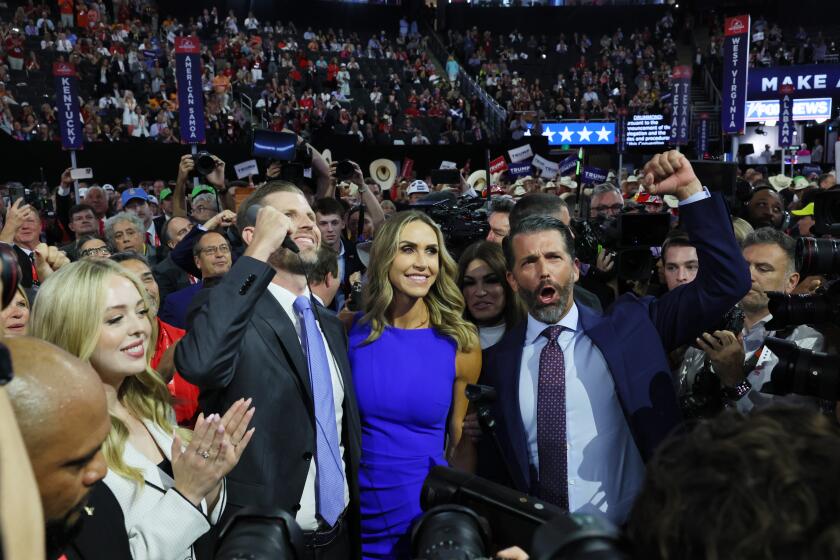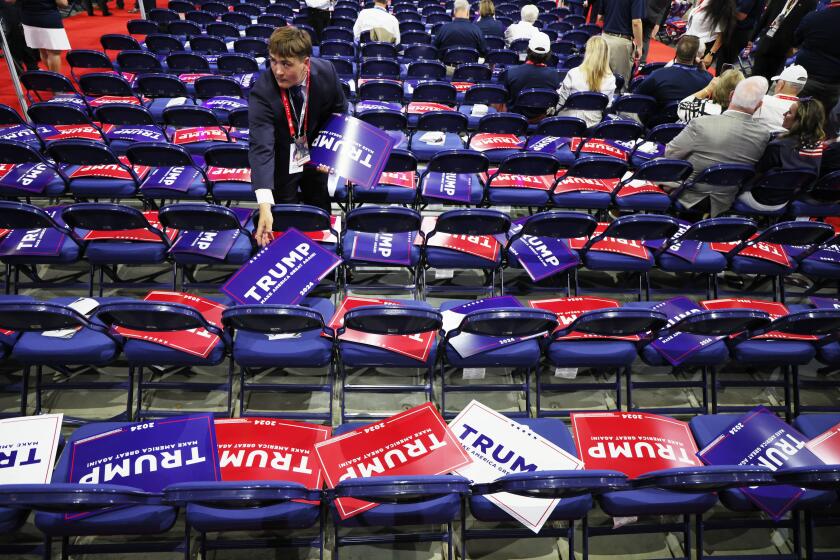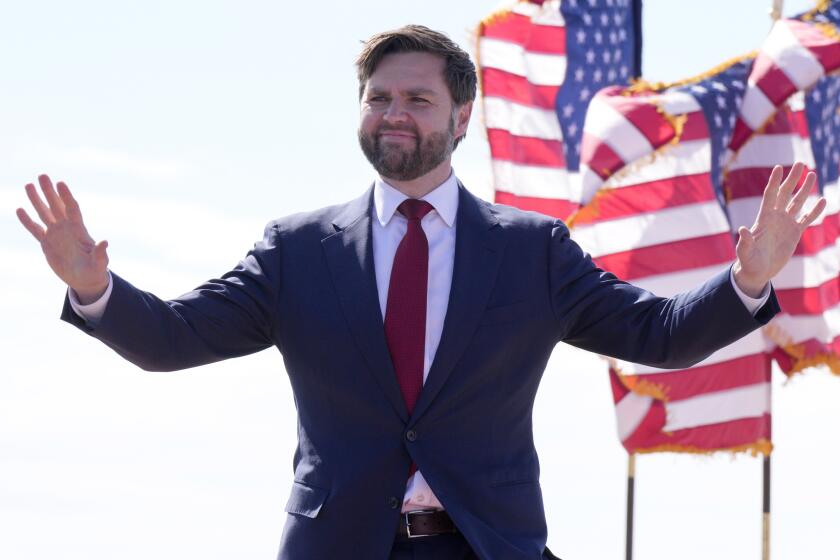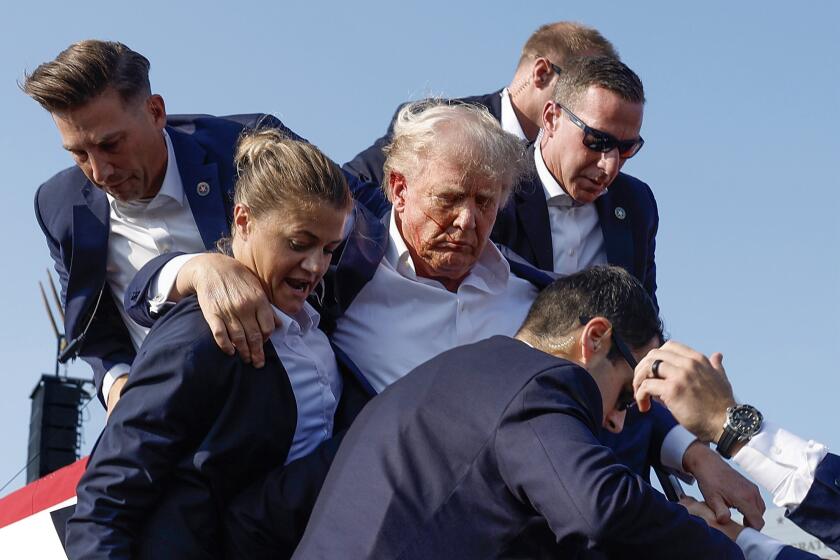Opinion: This is a turning point in Trump’s political life. What will he make of it?
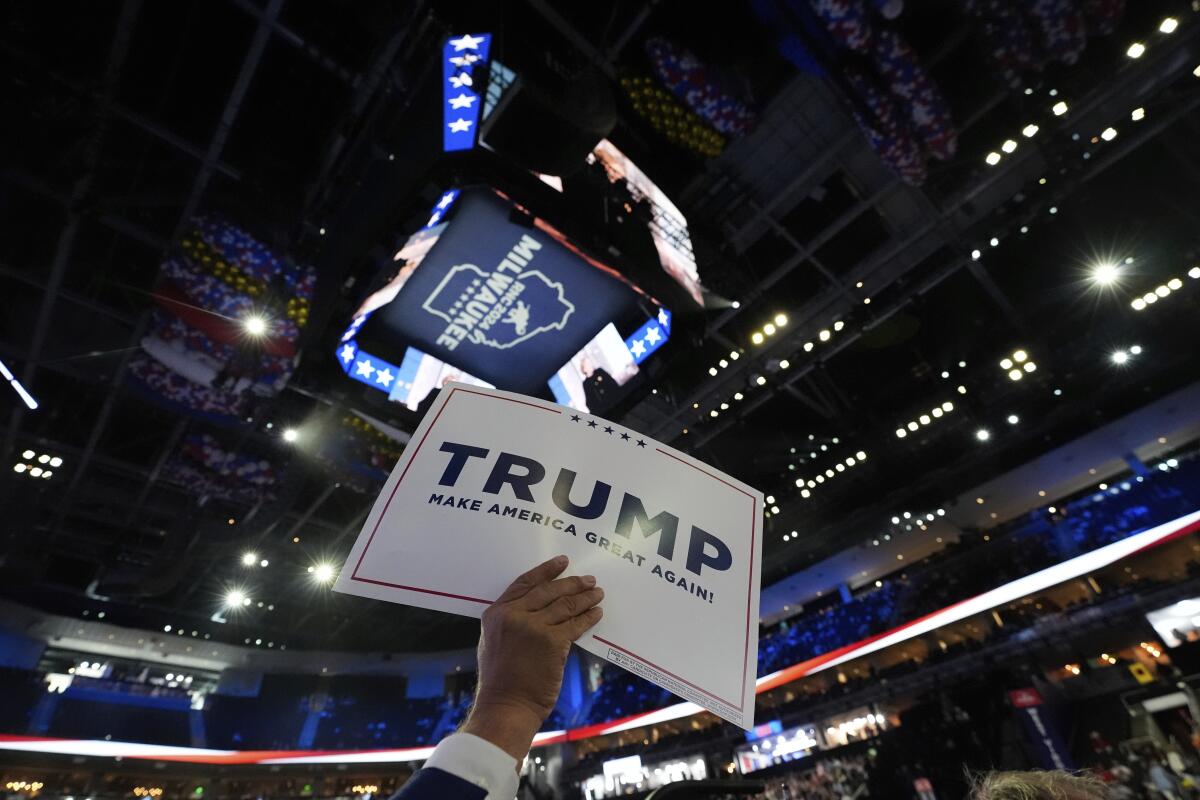
Not since President George W. Bush ascended the rubble of 9/11 and grabbed his famous bullhorn has any president or national political figure had a chance to unify the country the way Donald Trump does this week.
One inch (or less) is all that separated Trump from death or serious injury Saturday night in Butler, Pa. While the picture of Trump with his fist raised and the American flag above his head will live on, the image I can’t stop thinking about is the incredible shot of Trump speaking, with the streak of a bullet showing up behind his head, possibly the bullet that grazed his ear.
“I’m not supposed to be here, I’m supposed to be dead,” Trump told the New York Post’s Michael Goodwin. “I’m supposed to be dead.”
Two days after he survived an assassination attempt, former President Donald Trump officially became the Republican nominee for president for the third straight time.
Since that moment, President Biden has addressed the nation four times in at least a partial effort to regain the narrative or even a sliver of our collective attention. But the president hasn’t succeeded, and now the most important moment in Trump’s political life is upon him — and with it, the chance to take away Biden’s argument for his political existence.
Biden is supposed to represent stability. And yet, many Americans perceive economic and political turmoil, if not downright chaos.
Biden ran to be a unifier. To “heal the soul of the nation.” But now it feels like we are more divided than ever.
Some experts see the attempted assassination of Trump as an epic security failure, questioning how the gunman could have gotten onto the roof of a nearby building.
And Biden was supposed to be the adult in the room with a promise to rise above politics and move the country forward, especially in restoring America’s standing in the world. While some of our allies may be happier with Biden than they were Trump, it hasn’t translated to domestic political success. Biden’s disastrous August 2021 pullout from Afghanistan sucked his job approval deeply underwater, and it has never recovered. Purely as a political matter, Biden has struggled to wash off the feeling that he and his team are anything other than slow and indecisive amateurs whose performance doesn’t match the hype.
Trump’s framing of the 2024 election has always been simple: his strength versus Biden’s weakness. That message was already paying big returns following Biden’s disastrous debate performance, but now it’s at an entirely new level.
The image of Trump rising up amid the scrum of Secret Service agents and imploring the rally crowd to “fight” stands in stark contrast to Biden’s withered appearances.
Republicans and Democrats alike have called for a kinder, gentler campaign in the wake of the assassination attempt on Donald Trump. But will they really tone it down? And more importantly, should they?
Discussion of what Trump will do with his acceptance speech this week is on the lips of all the delegates in Milwaukee, where the Republican Party has gathered to officially give Trump his third chance at the presidency. And it seems like Trump himself may be having something of a personal epiphany in the wake of his near-death experience.
“I had all prepared an extremely tough speech, really good, all about the corrupt, horrible administration,” Trump told Goodwin. “But I threw it away.”
Will this be the week that Trump dispenses with his pugilistic animal spirit and rises above the fray? It may well be.
In 2016, his campaign often felt less Republican than it did independent. He took on both parties. He rejected long-held Republican policy orthodoxy. He ran against the Washington swamp and everyone in it, sparing neither party’s elites in the process.
The running mate for Donald Trump showed in his 2016 memoir that he doesn’t understand or respect the working class. The media should call him out on that.
Trump was not a lifelong Republican when he won the GOP nomination then, but today he is the unquestioned leader of a party remade in his image. His choice for vice president, 39-year-old Ohio Sen. J.D. Vance, signals a MAGA succession plan for American politics that could long outlive Trump himself.
But inside Trump, there has always been an independent — even a moderate — bubbling below the surface of a major party nominee.
“I want to try to unite our country,” Trump said to Goodwin. “But I don’t know if that’s possible. People are very divided.”
The attack that wounded Donald Trump was another sign of what counterterrorism agencies are facing: a spectrum of homegrown extremists looking to strike out.
Maybe we are. But wouldn’t it be nice to see a presidential candidate try to unite the country around something better and more hopeful?
Yes, there will be “never Trumpers” for as long as any of us are alive. And there will be old-style Republicans who aren’t all that comfortable with Trump’s new populist platform.
But this week, Trump has our national attention. He has the leverage. He has the political capital. And he has the moment.
And on Thursday night, he could deliver a speech that leaves his opponent to history and begins to shake this country free from the grip of disunity that has paralyzed us for too long. Will he?
Scott Jennings is a contributing writer to Opinion, a former special assistant to President George W. Bush and a senior CNN political commentator. @ScottJenningsKY
More to Read
A cure for the common opinion
Get thought-provoking perspectives with our weekly newsletter.
You may occasionally receive promotional content from the Los Angeles Times.
